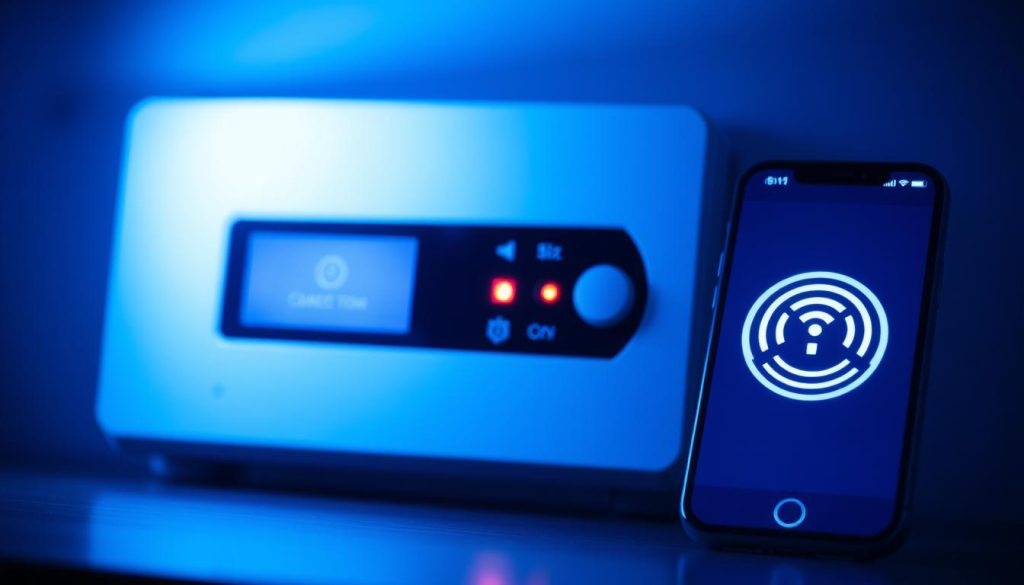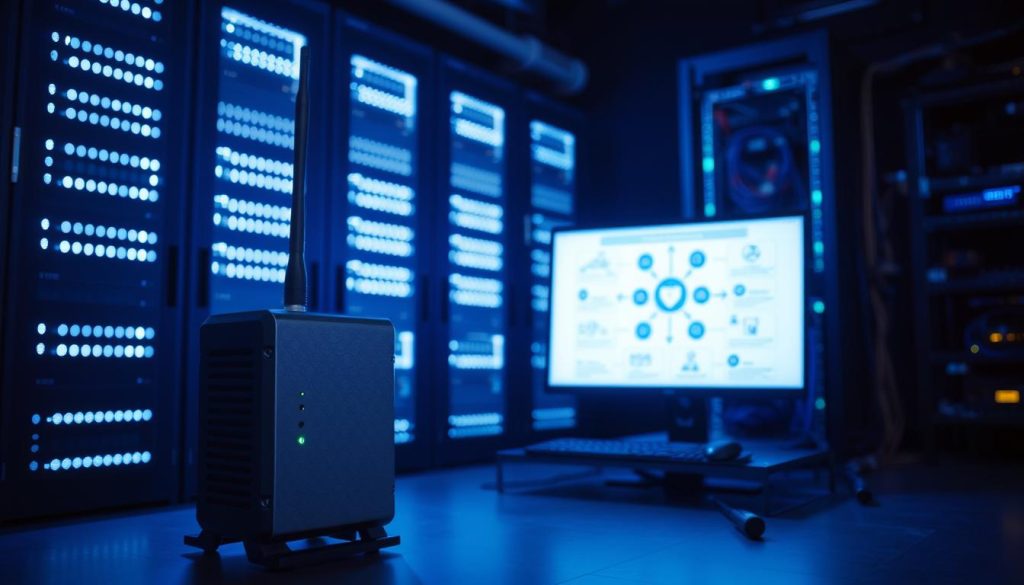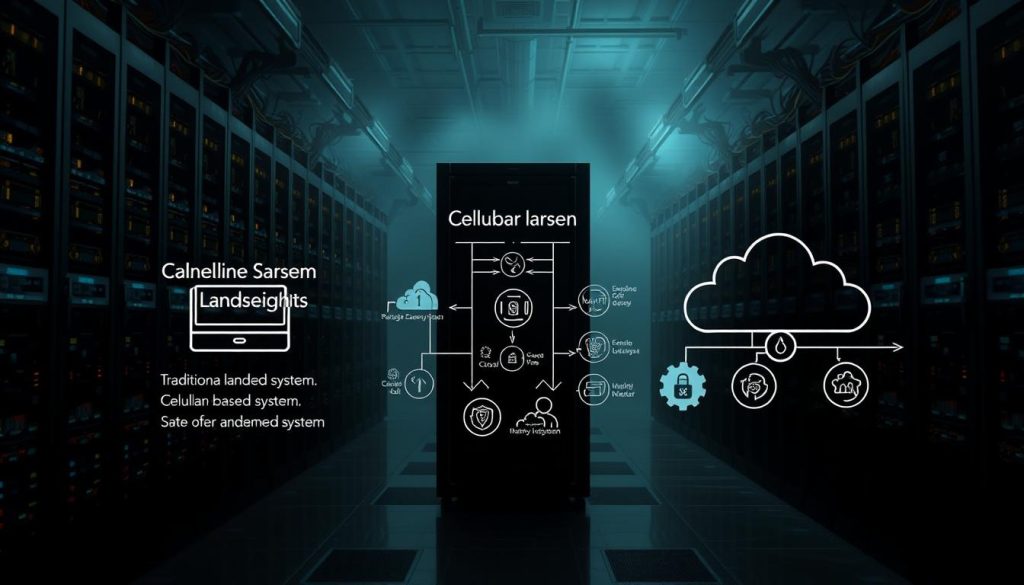In today’s world, security systems are key to protecting homes and businesses. The backup method used is vital for keeping them running.
Cellular backup is a common choice, but it has its own risks. Knowing these risks and following best practices is crucial to avoid them.
By learning about cellular backup, you can keep your security system working even when the main connection fails.
Key Takeaways
- Understand the importance of cellular backup in security systems.
- Learn about the risks associated with cellular backup.
- Discover best practices to mitigate these risks.
- Ensure continuous operation of your security system.
- Implement strategies for primary connection failures.
Understanding Cellular Backup Systems
A cellular backup system keeps your security system online even when your primary internet fails. It uses a cellular connection as a backup. This ensures your security system stays active and keeps sending uninterrupted monitoring and alerts.
The main advantage of a Security System Backup is better security and reliability. With a cellular backup, your security system works even if your main internet is down. This is key for businesses and homes needing constant security checks.
Cellular backup systems connect through cellular networks, which are often more reliable than regular internet. This backup is vital for keeping your security setup strong.
Knowing how cellular backup systems work and their benefits helps you make smart choices. It ensures your property stays safe and secure.
Potential Risks of Cellular Backup
It’s important to know the risks of using cellular backup for your security system. It’s a good way to keep your system working when power is out. But, there are some downsides to think about.
Signal Interference and Connectivity Issues: A big risk is signal interference. This can make your security system less effective. It can happen because of where you are or physical barriers. You need a strong and steady cellular signal.

Vulnerability to Cyberattacks: Another big worry is cyberattacks. Hackers might try to disable your security by attacking the cellular connection. You need strong cybersecurity to fight this off.
Here are the main risks of using cellular backup:
- It relies on the network being available, which can leave you exposed during outages.
- Signal interference and connectivity problems can happen.
- It’s vulnerable to cyberattacks aimed at the cellular link.
To deal with these risks, you should:
- Keep an eye on your cellular backup for any signs of trouble.
- Use strong cybersecurity to protect against hackers.
- Have a backup plan ready for when the network goes down.
By knowing and tackling these risks, you can make sure your cellular backup works well and safely. This keeps your security system protected all the time.
Identifying Security Gaps
You can’t keep your place safe without finding security gaps first. Making sure your Home Security Backup works right is key to keeping things secure.
To spot these gaps, check your security system often. Look at your cellular backup’s health and make sure it’s doing its job. Doing regular security checks is important. They catch problems early and keep your system ready for threats.

- Checking for software updates on all security devices
- Ensuring all components of your security system are properly connected and functioning
- Testing your Backup Monitoring Solutions to ensure they are working correctly
- Reviewing system logs for any unusual activity
By checking these areas often and fixing any gaps, you make your security system better. This keeps your property safe and gives you peace of mind.
Also, keeping your system safe means knowing about new threats and how to stop them. Stay updated on the latest security risks and how they might affect your Home Security Backup.
In short, finding security gaps is a big part of keeping your system safe. Regular checks and staying informed help keep your system strong against threats.
Best Practices for Implementing Cellular Backup
Getting your cellular backup right is crucial for your security system’s performance. You need to follow best practices to make your setup reliable and secure.
First, choosing a reliable cellular provider is key. This makes sure your backup stays stable and secure. You should pick providers known for their strong coverage and reliability.
Testing your cellular backup regularly is also important. It checks if your backup is working right. This way, you can fix any problems quickly. Also, having redundancy in your setup, like multiple backups, makes your system even more reliable.

By sticking to these best practices for cellular backup, you boost your security system’s security and resilience. This proactive step keeps your system running smoothly, giving you peace of mind.
Comparing Cellular Backup with Other Backup Methods
There are many backup options out there. It’s important to know how they differ. When it comes to your security system, you can choose from Wi-Fi, cellular, and landline backup.
Each option has its pros and cons. Wi-Fi backup is easy to set up but might not work during power outages. Cellular backup, however, uses cellular networks and is more reliable when other networks fail.

Landline backup systems are older but still reliable because they connect directly to the monitoring station. Yet, they can be at risk of tampering or line cuts.
It’s crucial to think about the risks associated with each. For example, Wi-Fi backup can face network hacking and signal interference. Cellular backup might deal with network congestion and signal strength problems.
- Wi-Fi Backup: Convenient, easy to set up, but vulnerable to network issues.
- Cellular Backup: More reliable during outages, uses cellular networks.
- Landline Backup: Reliable due to physical connection, but vulnerable to tampering.
Knowing these differences and risks helps you pick the right backup for your security system. This ensures it works well in different situations.
By looking at the good and bad of each backup method, you can make a choice that fits your security needs. This way, you can avoid potential risks.
Monitoring Your Cellular Backup System
It’s crucial to keep an eye on your cellular backup system. This ensures your security system works well. It also helps catch and fix problems fast, avoiding downtime and security risks.
Use Backup Monitoring Solutions for real-time alerts and system performance insights. These tools help you act fast on any issues. This keeps your security system running smoothly.
- Check signal strength and network connection regularly.
- Use real-time monitoring tools to spot problems quickly.
- Do system checks often to find and fix vulnerabilities.
Here’s a table with important features to look for in backup monitoring solutions:
| Feature | Description | Benefit |
|---|---|---|
| Real-time Alerts | Get notified right away of system problems | Act fast to fix potential issues |
| Performance Insights | Get detailed reports on how your system is doing | Make better choices to improve your system |
| Automated Testing | System tests run automatically | Keep your system reliable and ready |
By following Best Practices and using top-notch backup monitoring tools, your cellular backup system will be reliable. This protects your security setup.
Costs Involved with Cellular Backup
Understanding the costs of a cellular backup for your security system is key. This knowledge helps you plan your budget and make smart choices about your backup needs.
There are two main types of costs: initial setup and ongoing expenses. The initial costs cover the hardware and installation. You’ll need to buy a cellular backup module that fits your system. There might also be fees for installation, depending on who does it.
Initial Setup Costs:
- Cellular backup module
- Installation fees
- Configuration and testing
Monthly fees come from your cellular service provider. These can change based on the provider, your plan, and your system’s data use. It’s important to pick a plan that fits your system’s needs without costing too much.
- Compare different cellular service providers to find the best rates and plans for your needs.
- Monitor your security system’s data usage to avoid unexpected charges.
- Consider bundled services that may offer discounts for combining multiple services under one provider.
By understanding and managing these costs, you can keep your security system backed up and secure without overspending.
Mobile App Integration for Monitoring
Adding a mobile app to your security system brings unparalleled convenience and security. You can watch over your security from anywhere, getting updates in real-time. This lets you control your system better.
When picking a mobile app, look for a few important things. A simple interface makes it easy to use and manage your system. Notification settings are key too, letting you choose what alerts you get and how.
Being able to control your system through the app is a big plus. You can arm or disarm it, watch live video, and get updates on system events. This keeps your system secure and under your control.
To get the most out of your mobile app, follow these tips:
- Make sure the app works with your phone’s operating system.
- Keep the app updated to keep it secure and working well.
- Use strong passwords and two-factor authentication for extra security.
Using a mobile app with your security system makes it more flexible and secure. It boosts your security and gives you peace of mind. You can manage your system from anywhere.
Future of Cellular Backup Technology
The world of cellular backup is changing fast. New trends and tech are leading the way. Cellular backup for your security system will become even more important. It will help keep your security systems safe and working well.
The introduction of 5G networks is a big step forward. 5G technology will make cellular backup faster and more reliable. It will help your security systems work better, even when the main network is down.
New security features and better threat detection are on the horizon. These will help protect your systems from cyber attacks. Also, artificial intelligence (AI) and machine learning (ML) will change how we monitor and maintain these systems. They will help predict problems and cut down on downtime.
As these technologies grow, cellular backup systems will become even more key to security. The future is looking good, with improvements in:
- Enhanced network reliability
- Advanced security features
- Better integration with other security technologies
By keeping up with these trends, you can make sure your security system has the latest and best cellular backup tech.
Making an Informed Decision
Choosing the right backup for your home security system is key. You should think about your security needs, your property size, and your current system. This helps you find the best Home Security Backup for you.
Talking to security experts can give you great advice. They can suggest the Best Practices for a cellular backup that fits your needs.
By doing this, you make sure your security system is well-protected. This gives you peace of mind and better security. A good Home Security Backup system is vital for keeping your security strong.

